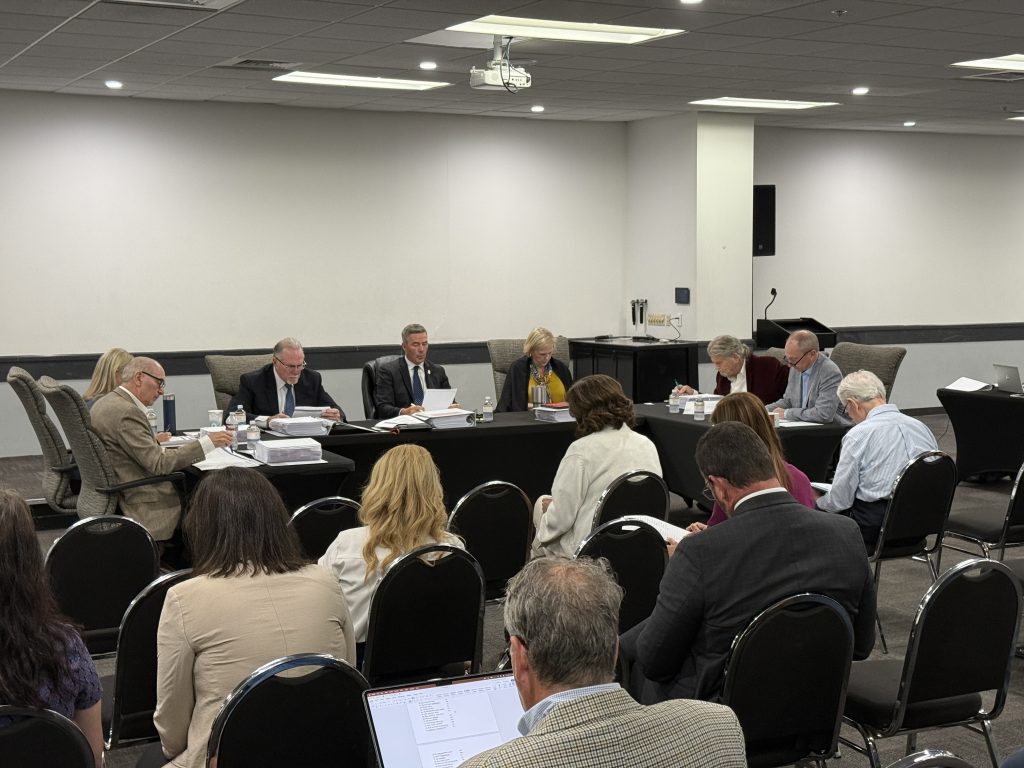
Governor Tate Reeves, August 2025 (Photo from Governor Reeves on Facebook)
- Governor Tate Reeves’ Fiscal Year 2027 Executive Budget Recommendation outlines priorities he would like lawmakers to consider when drafting the next state budget.
Mississippi Governor Tate Reeves released his required Fiscal Year 2027 Executive Budget Recommendation on Friday, outlining several priorities he wants lawmakers to consider as they begin crafting the next state budget.
Reeves focused his recommendations on five areas: building a stronger economy, preparing and supporting Mississippi’s workforce, improving mental health outcomes and helping keep Mississippians safe, supporting Mississippi’s courts, and giving parents more control in their child’s education.
The Joint Legislative Budget Committee, along with Reeves, met earlier this month to adopt a $7.532 billion revenue estimate to be used as a framework from which to build the Fiscal Year 2027 budget. The number is $20 million less than the current fiscal year’s revenue estimate, which was revised downward one percent by the Committee at its November meeting.
Energy and Economic Development
Governor Reeves is asking lawmakers to appropriate $20 million in Capital Expense Funds to support a state authorized process to help fast track the construction of generation, transmission, and pipeline infrastructure at sites designated by the Mississippi Development Authority. He said this enable Mississippi to expand essential energy infrastructure quickly and attract billions in new private sector investment.
Notably, during Reeves’ tenure, Mississippi has seen upwards of $45 billion in private sector investment, much of which has come by way of data center investments which utilize significant amounts of energy.
To prevent energy supply chain disruptions, the governor is also proposing an Energy Infrastructure Bank be created and $100 million in Capital Expense Funds be appropriated to secure long lead time energy components for the state. In addition, he would like to see another $3 million go to establish an innovation accelerator program to increase energy technology development and energy diversification as well as $20 million to build out project-ready sites
throughout the state.
Workforce Development
In an effort to support working families Governor Reeves would like to see $1 million to support the development of a Tri-Share Model to meet the needs of employers, employees, and Mississippi families.
“The Mississippi Tri-Share Model allows employers to share the cost of child care tuition with employees and the state of Mississippi. This public-private partnership requires an active role/investment from each participating party, while simultaneously providing immediate and long-term benefits to the state’s workforce and economy,” Reeves outlined. “In short, everyone shares costs, responsibilities and rewards – and everyone has skin in the game.”
In line with his workforce development efforts, the governor proposed $1.4 million for statewide expansion of Mississippi’s workforce training infrastructure through the creation of Accelerate Mississippi Talent Solutions Centers. The regional centers would be designed to train and deploy an additional 2,000-plus workers into high-demand careers, such as in commercial construction, broadband, energy generation, HVAC, plumbing, equipment operations, electricians, welding, and industrial systems.
Reeves also wants the Mississippi Department of Employment Security (MDES) to transition from being an Office of Apprenticeship (OA) to a State Apprenticeship Agency (SAA). He said the change would give Mississippi greater autonomy over the development, approval, and oversight of apprenticeship programs, and allow the state to tailor these initiatives to meet its unique workforce needs.
Education Freedom
In terms of education, Governor Reeves pushed lawmakers to adopt expanded school choice options for parents and students across Mississippi, noting that education freedom is a major part of the Mississippi Republican Party and Republican National Committee platforms, and is supporting by President Donald Trump.
“Education freedom is the best step forward in preparing Mississippi children for their future. It will propel our state to even greater heights and it will help us maintain the ‘Mississippi Miracle,'” Reeves wrote. “Research consistently shows that education freedom improves outcomes for both students who participate and those who do not. It is a rising tide that lifts all boats, and this is one boat Mississippi cannot afford to miss.”
Reeves said it is time to unleash the full power of charter schools in Mississippi.
“For far too long, the number of charter schools in our state has stagnated due to overly burdensome regulations and unnecessary statutory restrictions,” Reeves said, adding that a student’s assigned public school district should not be allowed to retain a student if another district has agreed to accept them.
“I propose removing that burdensome restriction on public school transfers when there is the capacity to serve those students in another district. I am also calling on the legislature to explore models that ensure students do not encounter the deterring effects of tuition requirements that keep them from attending the school of their choice,” Reeves said. “Finally, I call on the legislature to remove the bureaucratic barriers to entry that have deterred charter schools from opening and flourishing in our state.”
Child Protective Services, Courts, and Capitol Police
As for other priorities mentioned in the governor’s EBR, Reeves is asking lawmakers to consider the following:
- $10 million for the Mississippi Department of Child Protection Services to build or renovate in-state facilities to house up to 50 children in state custody.
- $20 million to increase the capacity of the youth detention facility at Oakley and to construct/acquire two additional 100-bed secured youth detention facilities.
- $12.75 million to fund 25 full time youth court chancellors and associated staff.
- $8 million to modernize the youth court case management system.
- $2.1 million for a trial and appellate judges’ pay raise, as supported by the Chief Justice of the State Supreme Court.
- $3 million for the Capitol Police Department, with $1.5 million to restore a prior budget cut and the other $1.5 million for vehicles he said are need to adequately patrol the expanded Capitol Complex Improvement District in Jackson.
Recommended Year-Over-Year Budget Reductions
The EBR recommends budget reductions compared to the 2026 Fiscal Year on the following budget items:
- State Office of Public Defender ($728,000)
- Secretary of State Office ($208,000)
- Department of Finance and Administration ($7.25 million)
- Department of Revenue ($775,000)
- Agriculture and Commerce Department ($725,000)
- Mississippi State Cooperative Extension Service ($100,000)
- Department of Environmental Quality ($250,000)
- Grand Gulf Military Monument ($200,000)
- Oil and Gas Board ($2.3 million)
- State Fire Academy ($250,000)
- Military Department ($7 million)
- Department of Public Safety ($5.997 million)
- Veterans Affairs Board ($375,000)
- Veterans Home System ($6 million)
- Arts Commission ($3.8 million)
- PERS ($200,000)
Governor Reeves said his EBR proposes a balanced budget for Fiscal Year 2027.
“Through our collective efforts, Mississippi is writing new and impressive chapters for its history books. We are charting a better and more prosperous course for our state and her people that will last for generations,” Reeves said, adding that he is excited for what the future holds for Mississippi.









